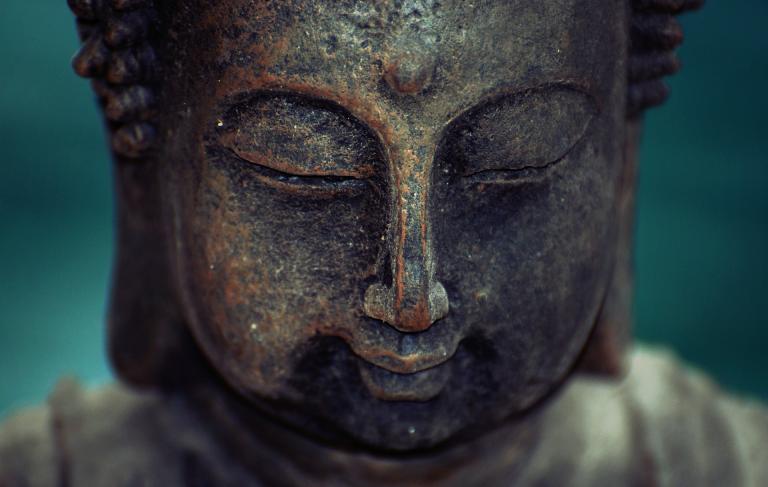It’s allergy season, and I can tell. I’m taking allergy medication, but the sneezes still get me. Today, as I sit trying to get some sort of meditation practice going, was one of those times. I settled down, cross-legged on my bed, earbuds in my ears, and tapped the play button on the meditation.
“Take a deep breath, and let your eyes drift shut …” comes the soft voice piped into my ears. I breathe in, and my nose starts to tickle. No. I breathe out through my mouth just in case. I breathe in again, and… “Achoooo!” There goes the calm. A few sneezes later, I settle back in and try again. This time, I get through 10 minutes without another sneeze.
This feels like my meditation practice. I try to get it going, and something comes up to break the rhythm. Then I try again – maybe this time it works, or perhaps not.

My teachers all tell me that I need to meditate. The Witchcraft and Druidry classes both say the same thing – meditation will help you with your focus, with your spirituality. The teachers in my work leadership and productivity classes say that meditation will help me be more productive, that it’ll help me focus.
Right.
I’ve tried Buddhist Zen meditation. I have attempted active meditations. I’ve tried a series of apps and guided meditations. They all work for a while. Well, except the zen meditation – I never got into the whole idea of not thinking and letting thoughts just flow out of my brain.
My most recent endeavor is mindfulness meditation. It seems to be the latest craze, but at least it doesn’t require me not to think or to ignore the thoughts in my head! There are several apps out there. Some mostly paid, some have more free content, some have enough free content for you to meditate every day.

So far, they have all been pleasant enough voices, with good enough guided meditations. I’ve been working on it for three months now. I still have a dist … squirrel! … distraction issue but I at least notice when I’m distracted now. My practice is far from daily, and I’m not sure if the benefits are worth the effort. I know that everyone says that they do, but everyone isn’t me.
I know some great, spiritual people who don’t meditate. Some don’t meditate due to time and crazy work hours and commutes, some don’t meditate because they find it very difficult and there are better ways for them to connect.
It does make me think why I am trying to meditate. Admittedly, this current round of meditation is for a class, but what about when that’s done? Does it make sense to continue to carve the time out of my already busy day? I never remember on weekends, so that doesn’t really count anyway.
I can lose myself in my sewing, or music and interrupt negative thought patterns or improve my mood there. I can feel connected to the spiritual world by standing on my patio, feeling the sun and enjoying the breeze. Is that enough? Do I really need to do this meditation?

Earlier this year, John Beckett wrote a blog post on meditation. In that post, Beckett talks about the different kinds of meditation that he practices. We’ve already discussed mindfulness meditation, and how I’m not a huge fan, but Beckett also discusses some other options that might work better.
The only one of the meditation types that I haven’t tried is contemplation meditation. Hmm … a meditation where the point is to think? That might work for me. I also forgot that walking or communing with nature can be a form of meditation.
Maybe there are some kinds of meditation that will work for me. Perhaps I can get the benefits of focus and reduced blood pressure if I just think a little creatively.
– – – – –
Since I’m new here, I should also introduce myself. My name is Victoria S, and I am a druid.
One of the more challenging questions I get when people find out that I’m a druid is, “What is Druidry?” Well, a druid is me, engaging in the world – both the physical and non-physical – doing what I can to do the job I love, to maintain the family I cherish, to engage with the community that supports me, and to be part of this world.
I am a practical Druid who struggles with balancing an urban life and a spiritual life. I spend about three hours a day in transit, work eight hours a day, and try to find time to balance all of my interests, studies, and spirituality. I grapple with meditation and finding time to keep up a daily practice. There are days where I stand on the platform waiting for the train and gaze at the sunrise, or at the moon still in the sky in awe. There are days where I drag my feet as I walk home from the station, ignoring the world around me because I am so weary. There are weekends where I stare thoughtlessly at the TV or a computer game, weekends where I am fascinated by the social interactions online, and weekends where I sit out on my patio and feel the warmth of the sun on my skin as I welcome in the blessings of the universe.

Most days are somewhere in between – days where I have the energy and focus to type up a blog post on the train home or find five or ten minutes to meditate or say a prayer at my altar. There is always more that I want to do, more that I feel I should do. Some days I don’t feel like a Druid, some days I barely feel human.
I am a member of two of the largest Druidry organizations – Ár nDraíocht Féin (ADF) and the Order of Bards, Ovates, and Druids (OBOD). These two organizations have different definitions of what a druid is. ADF is more of a practical focus, and is a registered Church in the US, while OBOD is more of a spiritual practice that is focused on your internal growth and how that is reflected in the world. I find that the two focuses balance very well in my psyche.
All of the different Druid groups – and there are many – have some things that are different and some things that are in common. In a fairly broad generalization, druids focus on community, working with the world around us, and service. Not every Druid does all of these things, but the traditions that I know encourage these things to different degrees.
My Druidry is about helping out in little ways, bringing a little hope and compassion where I can, doing what I can to support those who reach out and those who stand on the front lines. Druidry, to me, is about engaging in a way that makes sense to your circumstances.
I invite you to join me on this irregular journey as we explore what it means to be a Druid in the modern world.

















